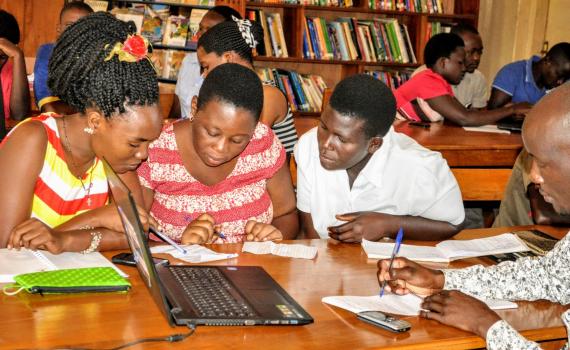
EIFL and partners have received a grant for a project that will enable 25 public and community libraries to provide digital literacy training to thousands of women and unemployed youth and connect them to free online learning opportunities.
Currently, just 48% of people in Uganda are using the internet, according to the Uganda Communications Commission UCC). The three main obstacles to internet use are lack of free or affordable access to technology, a desperate need for computer and online literacy skills, and limited awareness about the wealth of information, education, employment, communication and other opportunities the internet has to offer.
The project, titled ‘Digital skills @ your local library’, specifically reaches out to women and unemployed youth because they are most marginalized from computer and internet access.
“The grant opens up exciting, new opportunities for the EIFL Public Library Innovation Programme (EIFL-PLIP) to build on its previous work in Uganda and to focus on digital skills for women and unemployed youth. When equipped with technology and skills, public librarians play a critical role in narrowing the digital divide, contributing to inclusion of the most vulnerable groups in society,” said Ramune Petuchovaite, EIFL-PLIP Manager.
TACKLING OBSTACLES TO INTERNET USE
The two-year project tackles obstacles to internet use in three ways: it raises community awareness about the availability of free or low-cost internet access and training in libraries; it skills librarians from 25 libraries to become effective ICT trainers, and it connects learners to free online content and educational courses.
In addition to training women and unemployed youth who live in communities where there are libraries, the project will reach deep into remote rural communities, organizing digital skills camps, including using mobile phones to connect to the internet and find relevant information and services.
EIFL’s project partners are the National Library of Uganda (NLU), two non-governmental agencies, Peer 2 Peer University (P2PU) in the USA and Maendeleo Foundation in Uganda, and the 25 public and community libraries.
“The government, through the Uganda Communications Commission, is equipping libraries across the country with ICT. We expect that our project will strengthen digital literacy training capacity at all libraries that receive equipment. To bring them on board, we will have a fully designed digital literacy training programme and a team of experienced trainers,” said Adonia Katungisa, NLU Director.
“Through this project, my library will be able to demystify computers for people in my community who have been unable to access the digital world. Women and youth will become confident with ICT, including their smartphones, and be able to use them independently. I am thrilled that our library will be taking part,” said Isa Maganda, Chief Librarian at Nambi Sseppuuya Community Resource Centre.
The project is funded by Belgium through the Wehubit Programme implemented by the Belgian development agency, Enabel.
SHARE / PRINT









